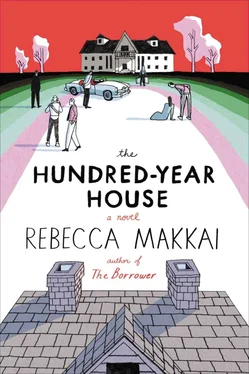Soon after, George went out to the pile himself and came raging back to where Grace sat in the solarium. “Where did the painting go?” he said.
“I don’t know what you mean.”
He seemed to be summoning the strength to fly across the room at her, but Max and Ludo had followed him, and here they came through the terrace doors.
“The painting!” he said. “ Your painting. You think I don’t know what you’re doing up there?”
“I didn’t paint it.”
“Mr. Grant,” Ludo said. “The painting is blown away. I am sorry. It — puff! — across the lawn while you sleep. I see it go.”
“Ha!”
“Let’s start the fire,” Max said. “While the night is young.”
Before he followed the men back out, George pointed at her. “If I see that painting again. If I find that you — I don’t like to be lied to.”
“I wouldn’t, George.”
“If I see that painting again, I’ll burn the whole place down. The whole house.”
She watched as Ludo poured gasoline on the pile. George threw the match, and everything went up in a glorious blaze.
—
The next morning, as soon as George took off, Max came into the dining room where Grace still sat at breakfast. The oak leaf painting was in his hands, rolled. “Can’t you give it to the college?” she said. “I’d put it in the bank vault, but George has a key.”
Without waiting for an invitation, Max sat in George’s seat. He unrolled the linen and touched his finger to the paint. “This ought to stay at Laurelfield,” he finally said.
“We can’t afford that.”
“The artist would want this to stay at Laurelfield. There are simply some things that you don’t remove from their natural habitats.” Amy opened the door from the kitchen, saw Max, and turned back. Now she’d be eavesdropping, but Grace didn’t have the energy to care.
“Even if we hid it in your personal effects — it’s just that George—”
Max said, “I know what George is capable of.”
“I imagine it’s valuable.”
“Yes. This is a very good artist.”
“I do love it. I love the edges of the leaves.”
“We could reconfigure it,” Max said. “It would be a great joke.”
“I don’t follow.”
“We could paint over it. And hide it in plain view.”
“I couldn’t destroy it!”
“You’d be preserving it, really.” The idea seemed to tickle him tremendously.
Really, the thought of George seeing it every day, walking past it, having no idea — it was appealing. It was a modicum of revenge. And when they were both seventy, and she needed to trump him in some battle, she’d point to the thing and say, It’s been there the whole time. You’ve been taking your coffee beneath the vagina for forty years.
“Would oil paint work?”
“It’s all that would do.”
That afternoon, using an advertisement for another kit from the back of the Paint-by-Numbers box as a guide, Grace painted it over with a farmhouse scene. It ended up not terrible for a rank amateur, and there was quite enough paint in the combined pots of Paint-by-Number oils that it covered the canvas thoroughly. She and Max carried it from the big house to the coach house together, each holding two corners of canvas.
Max knew where to get it framed, as soon as it was dry enough. Six days later, it was hanging in the library.
—
In the next week, Grace found herself struggling to rise from bed. The room would spin, and she’d lie back to sleep for another half hour, and eventually her hunger would bring her downstairs, if the smell of Amy’s horrible coffee didn’t keep her from the dining room.
Then she’d walk down by the little hill of ash where the fire pile had stood. She’d follow the paths in the woods.
George was sweet for a few days, until he wasn’t.
She realized she ought to move the portrait of Violet, just to be safe. Max stored it in his own room. When George saw it was gone, he wasn’t happy at all. He asked if she sold it, and even though she said she hadn’t, he asked how much she’d gotten for it, and what she’d done with the money. He threw his glass past her head, and it shattered on the spot where the painting had hung, and for a moment water streamed in a thousand little rivers down the wallpaper. Beatrice served the rest of the meal, and said that Amy had gone to bed with a sudden bug.
—
She saw Max enter the Longhouse, and two minutes later Sid Cole of Indianapolis followed. They stayed in there an hour. It happened again the next day, and then three days after that.
—
She didn’t want to sit in the attic now that it had been defiled, and so she tried perching herself on the huge, decaying tree stump between the coach house and the big house, her legs crossed. But she felt so strange and dizzy there. It might turn to a sinkhole and swallow her. She thought of the studios, but she couldn’t go into the Longhouse. She walked to the little one behind that. It had been a darkroom, Max said. And indeed there were both blinds and shutters inside the windows, and when she closed them it was dark as death. She sat on the daybed and tried not to feel her limbs. She opened the shutters and stared at the floor. Five dead bees. A dead ladybug, its body bleached pink by the sun. A 1939 penny. Someone was happy here once. Someone sang to herself and made her prints and didn’t notice when she dropped a penny.
—
A telegram from home: COME IMMEDIATELY OR NOT AT ALL.
—
That afternoon, Grace walked right up into Max’s apartment and sat at the table and called his name. He appeared in his doorway, his shirt unbuttoned and untucked. He put himself together and joined her. She said, “Max, if anything happens to me, if I go missing, if I turn up drowned in the fish ponds, I need you to know that George did it.”
“That — yes, I’m afraid that would be my assumption.”
“And if that’s the case, I want you to do to him whatever you must so that he doesn’t get the house and all the money. Finger him, frame him, poison him, I don’t care.” She’d said it, and there it was, and once she heard the words out in the air, outside her own mouth, she was sure she meant them.
“You might get out of here before that happens.”
“Well. Max, my father is very ill.”
“Yes.”
She shouldn’t have been surprised that he knew.
“When George was lying there, at the bottom of the stairs, I thought for a moment he was dead. And I thought, if George is dead and my father dies, I might do what I like. And I felt a tremendous lightness. It was only the tiniest moment, though.”
Max leaned across the table with an intensity she’d have been offended at a few weeks ago, before they became complicit together in the replacement of the files and painting, and in turning the Longhouse into a refuge for fairies. He said, “What is it you’d do?”
“I didn’t think it through. Maybe I’d reopen the colony. I could, you know. If I poured my trust fund into it.”
“You’d be starting from scratch.” He looked glassy and sad. His cheeks had turned pink.
“Yes, well. But you’d help, wouldn’t you? You’ve been here longer than anyone.”
He said, “I suppose I’m the memory of the place.”
“But it’s all just fantasy, and I shouldn’t let myself get ahead of my feet. Because what am I going to do? I’m not going to murder George.”
Max laughed, a harsh little laugh. “All you’d really have to do is nothing. Not rescue him. Next time, you leave him lying there. Next time will be different. But there will be equivalents.”
“Well. And divorce is the real option. I’ve not wanted to let myself consider it. But he—” She stopped herself a moment, so she wouldn’t cry. “Max, do you know what he did to Amy?”
Читать дальше












